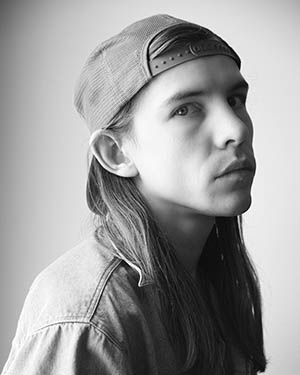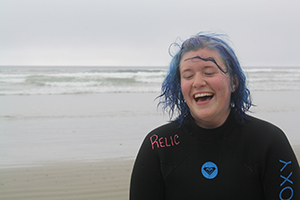Write, Share, Submit, Keep Pushing: Megan Warren in Conversation with John Elizabeth Stintzi

Malahat Review work-study student/editorial assistant Megan Warren talks with one of the three 2021 Long Poem Prize judges—and one of 2019's Long Poem Prize winners—John Elizabeth Stintzi about living within a poem, how the pandemic has affected their writing, and the importance of having a little space to breathe in a long poem.
John Elizabeth Stintzi is a non-binary novelist, poet, and visual artist who grew up on a cattle farm in northwestern Ontario. Stintzi’s work has been awarded the 2019 RBC Bronwen Wallace Award for Emerging Writers from the Writers’ Trust of Canada, The Malahat Review’s 2019 Long Poem Prize, and has been longlisted for the Writers’ Trust of Canada’s Journey Prize and the National Magazine Award for Poetry. They are the author of the novel Vanishing Monuments (Arsenal Pulp Press, 2020), the poetry collection Junebat (Anansi, 2020), as well as two previous chapbooks of poetry. Their writing has appeared in Ploughshares, Kenyon Review, Arc Poetry Magazine, Fiddlehead, The Malahat Review, Best Canadian Poetry, and many others. They currently live in Kansas City with their wife and a dog named Grendel.
What are you looking for in a winning entry?
This is one of those devious questions that I feel is impossible to answer, since I’m going in with no preconceived notion about what I want from a winning long poem. That being said, I do think that I want to see long poems which are more than simply long poems. Akin to the difference between the novel and the short story, I personally believe the long poem shines best when it shivers out of the usual hyper-dense structure of the poem every now and again, offering a certain texture via playing with its density that a shorter poem doesn’t generally have enough space to pull off.
I guess what I’m saying is that I personally tend to appreciate long poems that understand that their reader is on the other side of the page, and are kind enough to offer a little space to breathe here and there along the way.
You won the 2019 Long Poem Prize for your poem, “Cold Dying Black Wet Cold Early Thing.” What is it like to return to the contest as a judge after winning?
It’s an honour! The Malahat Review has been a very welcoming place for me and my work over the last few years, so I’m jazzed to play a tiny role in the magazine’s curation.
You mentioned in an earlier interview that you composed “Cold Dying Black Wet Cold Early Thing” in medias res (alongside the events you were writing about). Did you approach your recently published poetry collection, Junebat, the same way? Has your approach to poetry changed since “Cold Dying Black Wet Cold Early Thing?”
Yes, I started writing the poem while living through the events of the poem: during calving season, when my father brought a newborn calf he found mostly unresponsive into our house after a storm.
I don’t tend to write many of my poems like that, but it does happen on occasion, and it always feels strange and wondrous. I like to joke that this is an active rebellion against Wordsworth’s “emotion recollected in tranquility” idea of poetry composition. I actually think “Cold Dying Black Wet Cold Early Thing” preceded a lot of Junebat, but I know there are likely a few poems in Junebat which are similarly composed in-the-moment (“To a Sub-Hudson Kindcore Jersey Punk” jumps to mind as an excellent example) as well as other unpublished poems, or uncollected within Junebat.
I don’t think my approach has changed too much since then, but I do still—on rare occasion—feel overcome by a line or a turn of phrase in a moment that drives me to the page before the moment I want to write about has passed. I had that happen with one of the small selection of poems I’ve written in 2020, when my now-wife and I took our dog for a walk in a cemetery during the early days of COVID-19 down here in Kansas City. We were walking and suddenly phrases began knocking around in my head and I had to pull out my phone and transcribe as much as I could. That one definitely didn’t happen entirely in the moment, but I started capturing it within it, and so it is still a thing that happens every now and again. It is, I think, a magical—if also somewhat dissociative—experience to realize you are living within a poem, but I’m very glad that it isn’t the norm.
I found this line in the description of Junebat really intriguing: “Through the invention of the Junebat—a contradictory, evolving, ever-perplexing creature—Stintzi is able to create a self-defined space within the poems where they can reside comfortably, beyond the firm boundaries of the gender binary or the plethora of identities gathered under the queer umbrella.” Can you talk a bit about the practise of creating the Junebat as an image through which to explore mental health, identity, and other dynamic aspects of self?
I would hesitate to define the Junebat as an image, since it is quite impossible—I expect—to picture what a Junebat is (which of course was by design). That said, it was one of the most formative decisions of the book to invent a creature who was largely indefinable—that was slippery and convoluted—but which also acted as a stand-in for many different things. It also introduced the possibility for a lot more playfulness into the project, which was a nice thing to have in a book that touches on things like depression, identity, and dissociation.
Has the pandemic affected your relationship with your writing practise?
Yes. At first, it gave me good reason to turn away from the world and finish one of my novels, but after accomplishing that it has since drained me of a majority of my drive to write. But I think that’s partly the pandemic as well as all of the virtual events I’ve done for the two books I released at the start of the pandemic (Junebat and my novel Vanishing Monuments). I think a lot of my drive has deflated through publishing these two books under such radically different conditions than anyone was expecting even a week before it became impossibly clear—because of the grief for what may have been. I’ve also been teaching this fall, and turning back toward photography a bit, both of which I’ve used as an excuse to stay away from the page.
I think one of the big, operative difficulties has been that I haven’t really been able to read much, which—while I’m not the biggest reader out there—generally is a thing I need to be doing alongside writing. I’m hopeful, though, that things may shift in my favor soon.
You’ve won both the Bronwen Wallace Award for Junebat and the 2019 Long Poem Prize for “Cold Dying Black Wet Cold Early Thing.” Have writing contests and awards affected your writing career, and do you see value in them for emerging writers?
Contests and awards have certainly helped my career, though I don’t believe I should give them too much credit for my successes (such as they are)— though the Bronwen Wallace and the Long Poem Prize did coincide with my being bold enough to quit a job that was slowly killing me earlier than I expected to be able to, which I think can be the most transformative experience to any writer/human being! The awards (and longlist nods) have probably “legitimized” me a bit on paper, but I had already been publishing pretty admirably before them, so they feel more proof of the momentum I was building for the few years previous.
In terms of the value of contests for emerging writers: I don’t know. At the end of the day, they should be treated like a lottery ticket: it’s best to not put too much stock in one’s performance in them, because so much comes down to getting lucky about how your piece is read. I know that I personally wasted a lot of money submitting to contests in the early years of submitting, with nothing to show for years before I ever was even a finalist for something. If I could go back in time, I wouldn’t have submitted to so many. I think, for emerging writers particularly, submitting for publication is far more important. Submitting to contests (I’m specifically talking about ones you need to pay to submit to) can be a good vote of confidence to give yourself—especially if it comes with a subscription to a magazine you like—every now and again. I like to think of it as a way to signal to yourself how much you believe in the work you submit. At the end of the day, though, writing what you care about and getting it read by humans is the thing to prioritize. An award probably won’t do too much to change the trajectory of your career if the reason you are writing isn’t, at its core, to connect with some readers.
So, if you’re an emerging writer reading this, I’d say the most important thing you can do is write, and the second most important thing you can do is share that with people, and the third most important is to submit to be published (if that’s important to you). And if you’re submitting work to contests, don’t let any failure to win (or make it to the finalists) be toxic to your confidence in your work. Frame submitting to contests as a way to show yourself how awesome you think your work is—that’s the award that will help you the most. Then, win or lose, keep your head down and keep pushing forward.

Megan Warren
* * * * * * * *









